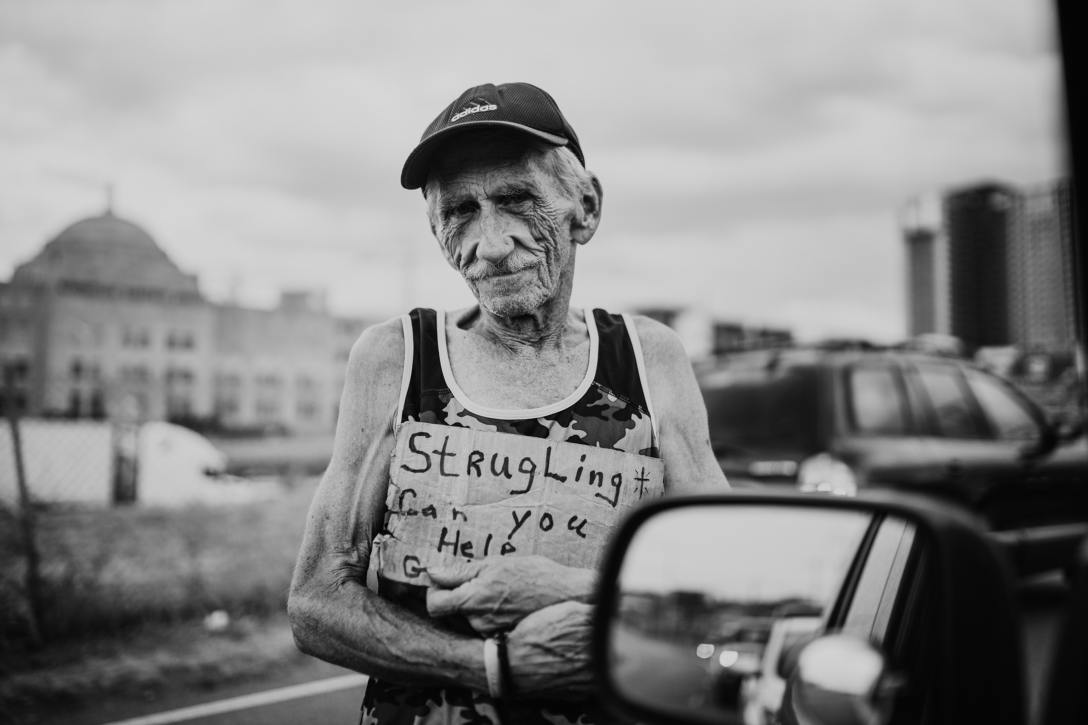We live in the city, and we see many homeless people with signs on the road and on the sidewalk downtown. My kids see them, but it wasn’t until last year that my oldest son said something. He began by asking me questions, like who’s helping them? And what can we do? So, we joined up with a group from our local church and went to a homeless shelter to serve up food we brought and ate together (pre-COVID, so we only had a chance to do this one time). But this year my son brought it up again and said he wants to help the homeless and the poor. So, we’re looking into what we can do this year to help them. My son also had the idea to keep his coin purse in the car to hand out money at times when we’re driving.
My son sees. He doesn’t close his eyes in deliberate ignorance, but he opens them wide in love and care and moves forward in compassion. My son sees the hurting in our city. He sees how God sees.
My boys and I have started reading the book of Exodus together, and we’ve read about the suffering of the Israelites under the Egyptian Pharaoh. In a time when God’s people were slaves and suffering under infant male genocide the Bible says this, “God saw the people of Israel — and God knew” (Ex. 2:25). God moved towards his people in compassion when he called to Moses from a burning bush and said, “I have surely seen the affliction of my people who are in Egypt and have heard their cry because of their taskmasters. I know their sufferings” (Ex. 3:7).
God sees.
Jacob loved Rachel more than her sister Leah. Leah was mistreated by her sister, and despised and rejected by her husband. Yet, “When the Lord saw that Leah was hated, he opened her womb: but Rachel was barren” (Gen. 29:31). God saw Leah even when her husband did not. And it was through Leah’s womb that the line of Jesus came through, not Rachel’s. Our God sees the despised and rejected and moves toward them; he even chooses them and raises them up for great purposes.
Another woman from the Old Testament (one who is not technically one of God’s people, the Israelites), whom God saw in her suffering, was Hagar. Sarah could not bear Abraham children and, instead of waiting longer on the promises of God, they took matters into their own hands. Sarah gave her Egyptian slave girl, Hagar, to Abraham as a surrogate. The Bible then goes on to say that Sarah mistreats Hagar, so Hagar runs away. God stops Hagar and says he has heard of her misery and he promises to take care of her. Then it says this in Genesis 16:13:
“She gave this name to the Lord who spoke to her: ‘You are the God who sees me,’ for she said, ‘I have now seen the One who sees me.’”
God saw Hagar first and then she saw him.
We serve a God who sees. He sees us right where we are: In our desperation, our affliction, our pain, and distress. He sees us in our trauma and in the aftermath of it. Though it might feel to us that he hides his face, “The eyes of the Lord run and fro throughout the whole earth, to give strong support to those whose heart is blameless toward him” (2 Chron. 16:9).
Jacob was chosen by God and yet God also saw a woman who was victimized by his sin and he chose her too. Sarah was chosen by God to bear the promised child for Abraham, but God did not overlook another woman who was a victim of Sarah’s sin. He is a defender of the weak and he always sees mistreatment. The Psalmist says,
“Arise, Lord! Lift up your hand, O God.
Do not forget the helpless.
Why does the wicked man revile God?
Why does he say to himself,
“He won’t call me to account”?
But you, God, see the trouble of the afflicted;
you consider their grief and take it in hand.
The victims commit themselves to you;
you are the helper of the fatherless.
You, Lord, hear the desire of the afflicted;
you encourage them, and you listen to their cry,
defending the fatherless and the oppressed,
so that mere earthly mortals
will never again strike terror.”
(Ps. 10:12-14, 17-18)
It’s clear in Exodus, as God demonstrates his power through signs and wonders in Egypt, that he uses his power on behalf of the weak and the oppressed. He works for the victims. He is the God who sees, who hears, and who acts. He sees the poor and the homeless just as my son does. My son’s heartbeat for them is the same heartbeat of God’s. My son doesn’t look the other way, he looks straight at brokenness and is moved by it. God sees and is moved as well.
